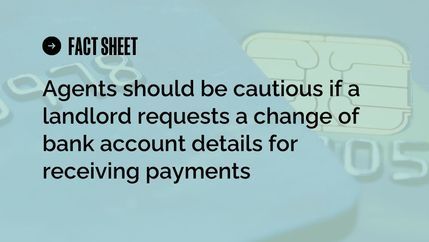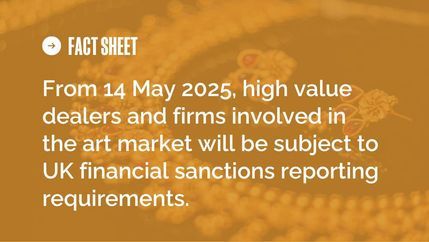AML registration failures still the top cause of painful agent fines
HM Revenue and Customs (HMRC) has issued hundreds of thousands of pounds in new fines to property agents for failures to comply with anti-money laundering (AML) regulations, reinforcing the consequences of getting compliance wrong. The latest enforcement action covers the 2025–26 reporting period and includes 170 penalties issued to estate agency businesses, totalling more than £835,000. Letting agents are also within HMRC’s supervisory scope where transactions meet the required thresholds.
Single sanctions list launches on 28 January 2026 for simpler checks
All UK sanctions designations maintained by the UK Government will be consolidated into an official list and updated in one place. This is a significant operational change for property agents, auctioneers and other regulated businesses, which should make checking clearer and more straightforward. Sanctions compliance are part of wider financial sanctions and anti-money laundering obligations, and failures can carry serious legal and reputational consequences.
Propertymark at the table as officials shape money laundering reform
Head of Policy and Campaigns, Timothy Douglas, met senior officials at the Foreign, Commonwealth & Development Office (FCDO) on 8 December to discuss how economic crime affects the property sector, particularly the role of real estate in laundering illicit wealth and the regulatory gaps that can facilitate this activity. Meanwhile, the UK Government published its Anti-Corruption Strategy 2025, setting out plans to strengthen the UK’s defences against illicit finance.
Spring 2026 is set to show new growth for pooled client accounts
Propertymark shared member survey data to illustrate the challenges faced by agents when the UK Government requested evidence on how the UK Money Laundering Regulations could be improved. Ministers have listened, and regulations expected to take effect in early 2026 will have sensible changes to Customer Due Diligence and improve access to compliant business banking services for agencies.
UK Government confirms new AML supervisor — no change for property agents
The Financial Conduct Authority (FCA) will become the Single Professional Services Supervisor (SPSS) overseeing Anti-Money Laundering and Counter-Terrorism Financing (AML/CTF) compliance for the legal, accountancy, and trust and company service sectors. HMRC will continue to supervise agents under the Money Laundering Regulations, and firms that are already compliant do not need to make any changes to their existing AML procedures.
Clear and workable process is needed for an effective financial sanctions regime
Following major changes in global sanctions since 2018, the Office of Financial Sanctions Implementation (OFSI) has sought views on how to update its penalty, disclosure, and settlement frameworks. Reforms should both strengthen deterrence and make it easier for businesses, including property agents, to comply and report breaches confidently.
£10 billion could be laundered through the UK property sector every year
The 2025 National Risk Assessment (NRA) has once again placed the property sector in the spotlight as one of the most attractive ways for criminals to conceal illicit wealth. Complex ownership structures, offshore companies, and opaque trusts continue to disguise the identity of the individuals behind transactions, with both residential and commercial sales and lettings vulnerable.
Unaffordable AML fees could drive greater non-compliance
Propertymark has responded to HMRC’s consultation on plans to increase the fees it charges businesses it supervises under the Money Laundering Regulations, warning that higher costs could affect small, independent agents hardest and risk undermining compliance. Proposals include raising the annual premises fee from £300 to £400, reintroducing a £400 application fee, and restructuring penalty charges into a new sanction regime with fines of up to £2,000.
Fact Sheet: Landlord payment requests
This guidance note helps members understand the steps they should take when a client requests payments to be made into a new account. This will support agents in protecting landlords who may have been compromised and in avoiding potential penalties from HMRC.
Cracks in the system allow property crime to flourish
A BBC investigation has revealed that criminals used the UK Government’s unclaimed estates list to commit probate fraud. The list, published on the Gov.uk website, included details of around 6,000 estates left by people who died without a will or known heirs. It was taken offline in July 2025 after evidence showed fraudsters used it to submit fake wills and claim millions of pounds in assets.
Further tranche of agents hit with penalties for AML failures
194 agents have incurred penalties totalling over £1 million for breaches identified by HM Revenue and Customs between October 2024 and March 2025. The vast majority are a result of failing to register for Anti-Money Laundering (AML) supervision on time – the most common reason agents are fined. This highlights how important it is for property professionals to understand the rules, apply correctly, and maintain an up-to-date registration with HMRC.
Propertymark throws spotlight on weakness in sanctions rules
Our robust response to the House of Commons Foreign Affairs Committee consultation on sanctions scrutiny outlines the disparity between the sanctions and anti-money laundering (AML) regimes and underscores the necessity for clearer, more consistent regulations and stronger UK Government support for letting agents navigating complex obligations. Implementing our recommendations will bolster compliance, protect agents, and significantly reduce the risk of economic crime in the UK property sector.
Fact Sheet: UK Sanctions Reporting Obligations for High Value Dealers
Under the Sanctions and Anti-Money Laundering Act 2018, the UK Government introduced a new regime of issuing financial sanctions following the UK’s departure from the European Union. Under the Act, businesses specified in the Act have to report to Office of Financial Sanctions Implementation (OFSI) if they suspect they are engaging with a client who is under financial sanctions.
A stark warning on property fraud as man regains possession of stolen home
Fraudsters exploited the vulnerabilities in the property transaction system by stealing a homeowner’s identity and using a fake driving licence to set up a bank account in his name to facilitate a sale in 2021. After four years, on 11 March 2025, a County Court finally granted the owner full possession of his home.
Lettings Spotlight: financial sanctions reporting obligations
Letting agency businesses across the UK need to work to a new framework from 14 May 2025 under the Sanctions and Anti-Money Laundering Act 2018, and it is vital that every agent understands the rules and adjusts working practices and systems accordingly. Through our vast network of members, some confusion has been highlighted around the rules, and we have produced resources to navigate the requirements.
Fact sheet: Writing an AML risk assessment
Under the Money Laundering, Terrorist Financing and Transfer of Funds (Information on the Payer) Regulations 2017 (the MLRs) all Estate Agency Businesses and Letting Agency Businesses with properties that have a monthly rent that is the equivalent to 10,000 Euros or more, must produce a risk assessment.













